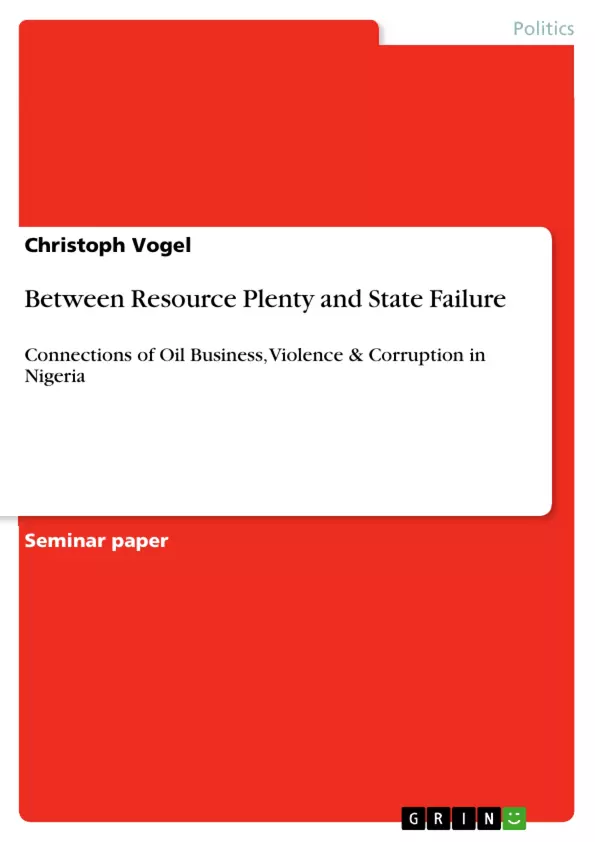Mineral wealth and concomitant phenomena of violence state weakness and corruption
have been widely brought into contact by numerous scholars, as a considerable number
of empirical cases seem to give evidence to this. Particularly in Sub-Saharan Africa the
examples of Sierra Leone, Nigeria, Democratic Republic of Congo and Angola – just to
mention some of the most striking ones – led to various hypotheses about the influence of
resource plenty on governance issues. Due to several specific characteristics, the case of
Nigeria is different to many others. First of all, the Federal Republic of Nigeria turned out
to be Africa’s most populous state with about 140 million citizens. In addition the social
situation is rather unique, as Nigeria consists of more than 250 ethnic groups. The more
than 500 spoken languages spoken in the country further illustrate the socio-cultural
diversity. Nevertheless the three major communities include more than two thirds of the
country’s total population.
On the socio-economic dimension a key feature is the overwhelming importance of
oil as almost single export good and major contributor of the country’s GDP. The strong dependence on oil has been challenging Nigeria’s economy
considerably and can be seen as a major reason for socio-economic disparities throughout
the country, not to forget that it has been the origin for its ‘(political) Dutch disease’.
Contrarily to other so-called ‘crisis-states’ the main issues threatening statehood and
stability in Nigeria can be rather seen as domestic problems. Transnational issues like the
relations with Cameroon do not have the same structuring quality as in other states.
Although Nigeria improved in TI's CPI of 2008 the country still faces ‘institutionalized’ clientelism and
rent-seeking at almost each political and social level as poor performance in ‘group grievance’, ‘delegitimization of the state’ or ‘factionalized elites’ may illustrate. Secondly
manifold forms of institutional and informal violence are destabilizing the socio-political
architecture. Various attempts to counter those phenomena have been ineffective or
implemented insufficiently, sometimes not at all. The result is a current situation of
disorder, human insecurity, economic inequality fed by a prosperous environment for
individual enrichment provided by a state which is rather effective in facilitating illicit
political and economic behaviours, be they plundering of public goods, drug or weapon
trade or other.
Inhaltsverzeichnis (Table of Contents)
- 1. INTRODUCTION
- 2. THEORETICAL ASSUMPTIONS
- 2.1 STATE WEAKNESS AND STATE FAILURE
- 2.2 'SHADOW-STATEHOOD'
- 2.3 GREED AND GRIEVANCE IN WAR ECONOMIES
- 2.4 'THE POLITICS OF THE BELLY' REVISITED
- 3. POLITICO-ECONOMIC DEVELOPMENT
- 4. THE POLITICAL SYSTEM OF NIGERIA
- 5. POLITICS, VIOLENCE & IMPUNITY
- 6. GODFATHERS, CORRUPTION & CLIENTELISM
- 7. EXTERNAL FACTORS
- 8. ON THE NIGER DELTA CONFLICT
Zielsetzung und Themenschwerpunkte (Objectives and Key Themes)
This paper aims to provide a framework for understanding Nigeria's socio-political situation, based on the hypothesis that resource abundance can lead to institutional weakness and the emergence of violence and corruption, potentially culminating in state failure. It will examine this hypothesis through various theoretical lenses, incorporating political and economic perspectives. The analysis will then focus on Nigeria's specific post-colonial context, considering its political economy and social structure.
- The relationship between resource abundance and state weakness in Nigeria.
- The role of violence and corruption in undermining state institutions.
- The interplay of political and economic factors in shaping Nigeria's development.
- The impact of Nigeria's diverse ethnic and social landscape on its political stability.
- The influence of external factors on Nigeria's internal conflicts.
Zusammenfassung der Kapitel (Chapter Summaries)
Chapter 1: Introduction introduces the central research question concerning the link between resource wealth, violence, and state weakness in Nigeria. It highlights Nigeria's unique characteristics, including its large population, ethnic diversity, and heavy reliance on oil.
Chapter 2: Theoretical Assumptions explores several theoretical frameworks relevant to understanding state failure, including the concepts of state weakness, shadow statehood, greed and grievance, and the "politics of the belly." These theories provide a basis for analyzing Nigeria's situation.
Chapter 3: Politico-Economic Development and subsequent chapters (4-8) will delve into the specific historical, political, and economic factors influencing the dynamics described in the Introduction and the theoretical frameworks developed in Chapter 2. These chapters analyze post-colonial development, the political system, violence and corruption, the role of "godfathers," external factors, and the Niger Delta conflict. Details of these analyses will be presented in the full text.
Schlüsselwörter (Keywords)
Nigeria, state failure, resource curse, violence, corruption, oil, political economy, ethnic conflict, institutional weakness, clientelism, Niger Delta.
- Quote paper
- Christoph Vogel (Author), 2009, Between Resource Plenty and State Failure, Munich, GRIN Verlag, https://www.grin.com/document/181554



